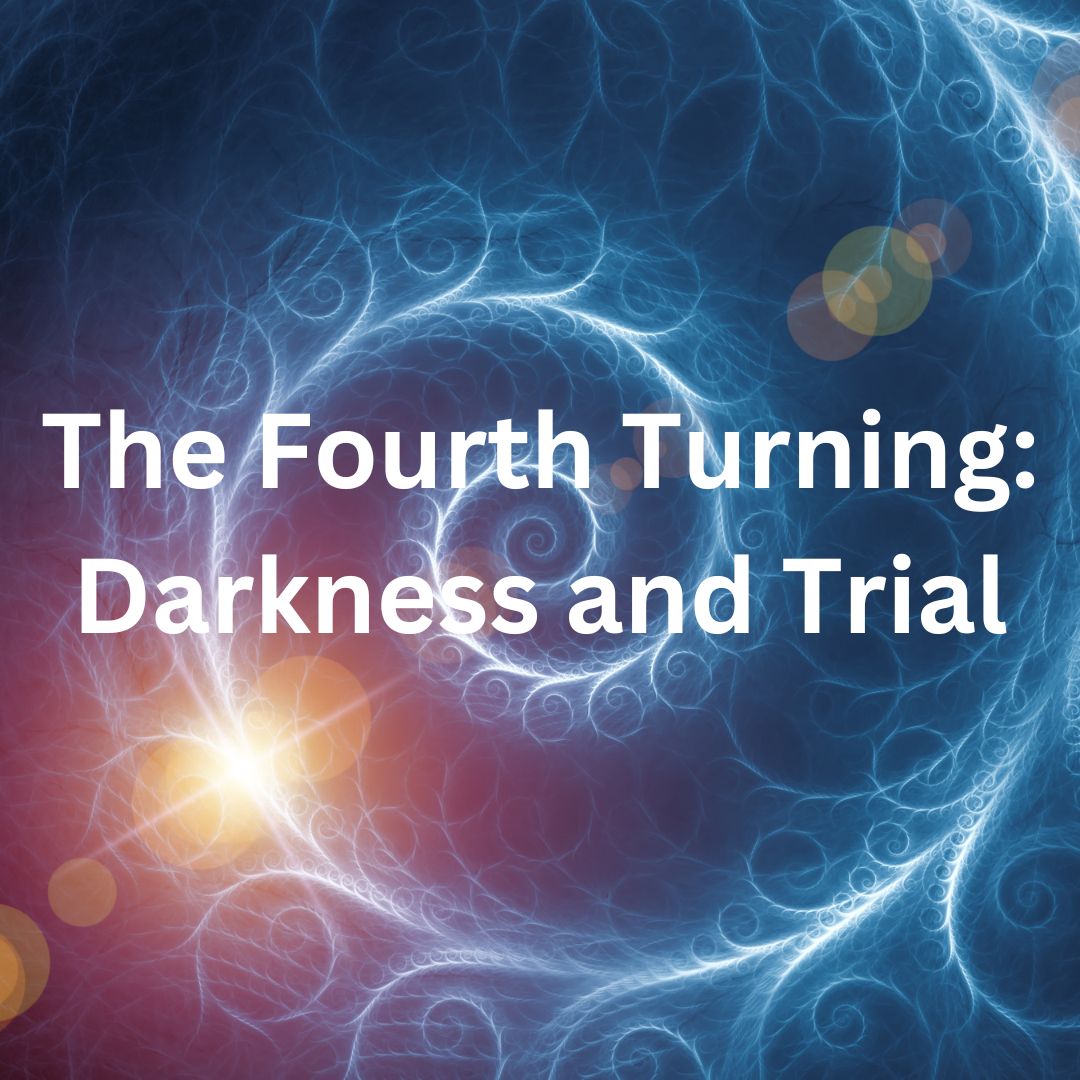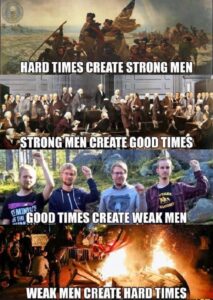
By Raul Zavaleta
In 1997, Neil Howe and his late coauthor, the satirist William Strauss wrote the book “The Fourth Turning: An American Prophecy”, in which, through an analysis of generation-driven historical cycles, they predicted that a period of political, economic, and social upheaval would rattle the United States midway through the first decade of the 2000s, culminating in an acute crisis or series of crises in or around the 2020s.
What did happen? The “trigger” event that it forecasted arrived pretty much on schedule with the economic crisis of 2008. Now, with its prophecy still seemingly on track, Howe has followed up with a book spelling out exactly where he thinks we’re headed: “The Fourth Turning is Here”. I just finished reading it.
Howe begins the book by describing the state of America: a government that can no longer carry out even the most basic tasks of governance; rock-bottom public trust among the American people and in institutions more broadly; hyper-partisanship; high economic inequality; declining public health; moral and legal chaos; strife between the sexes; and a collapse of family formation and birth rates. I am sure you will agree with this description, as we see our country and our cities plunge into disarray. Even the Catholic Church is going through this unstable state.
Howe writes that America has gone through a five-centuries-long “saecula” and is now at the end of a sixth. Each saeculum encompasses four generations corresponding to the seasons of the year. There is a “High” (spring) period, a new beginning; an “Awakening” (summer) when the next generation turns against its parents; an “Unraveling” (fall) when institutions start to decay; and a “Crisis” (winter) when everything falls apart, preparing the way for a new saeculum.
Howe describes the generations this way:
The first generation “founds and builds.” The second generation, too young to participate as adults in the founding, nonetheless matures into leaders who can “imitate” their elders and improve on their foundations. The third generation is the first to lose any contact with the founders’ experience. Its heart is no longer in the project. While its leaders try to invent “rules and traditions” to keep things going, the dynasty begins to decline. The fourth generation, in its turn, no longer cares about the dynasty and may even “despise” the founders’ collective spirit. Its members look after themselves and brace themselves for whatever comes next, for a world in which ‘asabiyya has vanished. They are “the destroyers,” writes Khaldun: They preside over the dynasty’s collapse.
According to Howe, we are now in the Crisis stage or “Fourth Turning” of the Millennial Saeculum that began after World War II. “Winter is here,” he announces. He describes the Fourth Turning this way:
A Fourth Turning is a solstice era of maximum darkness, in which the supply of social order remains low—though the demand for order is now steeply rising. It is the saeculum’s hibernal, its time of trial. In winter, writes William Cullen Bryant, “The melancholy days are come, the saddest of the year, / Of wailing winds, and naked woods, and meadows brown and sere.”
Once the Crisis is underway, a society begins a process of regeneracy, a drawing together into whatever definition of community is available at the time; we can expect a new First Turning sometime in the 2030s, Howe says.
Howe’s prediction rests on a model that at its core is timeless and simple: “Hard times create strong men, strong men create good times, good times create weak men, weak men create hard times.”

Howe predicts that “sometime before the mid-2030s, America will pass through a great gate in history.” During that time, “The risk of catastrophe will be high. The nation could erupt into insurrection or civil conflict, crack up geographically, or succumb to authoritarian rule.” A major foreign war is also highly likely. And any war, foreign or civil, “is likely to be one of maximum risk and effort—in other words, a total war—precisely because so much will seem to rest on the outcome.”
What could that event be? In my view there are several candidates: 1) Social Security, on the verge of collapse, pushes the national debt to unsustainable levels bringing down the dollar and creating another Depression. 2) China invades Taiwan forcing the US and its allies into a war that explodes into World War III as Russia, Iran, and North Korea align with China to fight the West. 3) the deep political division explodes to a level that encourages one or more states to secede triggering a civil war. 4) One of the two political parties galvanizes around one leader that helps destroy the other, forcing a counterreaction that may even explode in violence. There may be more.
Right now we have two groups, Blue, pushing new moral boundaries and socialism, and Red, fighting for traditional values and Capitalism. Howe does not say which group wins. But his model states that it is almost certain it will be different than the society we have now. I will add a third group: a silent moderate group that does not accept the extremes of either the Blue or Red group.
Despite his grim assessment, Howe is a resolute believer in the model optimistically predicting that by 2029s all the trends making us cringe will be reversed. Political gridlock and dysfunction will disappear. The economy will jolt back to life and achieve new heights of productivity and dynamism. Culture will flourish once more. A new moral consensus will be reached and enforced, commanding broad conformity. Millennials will have become the most communitarian generation in living memory, reenergizing civic society and committing themselves to family life. Religious participation will revive, though perhaps in unpredictable ways. Gender norms will swing back in favor of a new traditionalism. A sudden baby boom will end concerns about demographic decline. Crime will plunge to new lows, while social trust will reach new highs. Though Howe does not mention the Catholic Church, I wondered whether his Fourth Turning predictions will hold there as well.
Howe also predicts the victorious millennials will be a generation of “confident technocrats,” materialists with a youthful zeal for progress and grand ambitions to remake the world. In the new High after the Crisis, they will reinforce or re-found a sweeping, U.S.-led liberal-international order.
There is a bit of dystopia in his prediction. As he sees it, technology will be used to enforce a new morality and community. Is this what the future will be like? I am not sure. What seems sure is that the Fourth Turning will be brutal and that we should expect some hard times, perhaps even a major war. Howe offers us the hope, at least, that the Fourth Turning will entail a creative form of destruction. One way or another, America will soon change into a different country.
